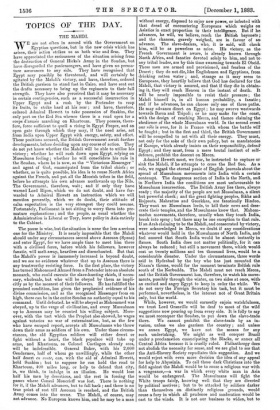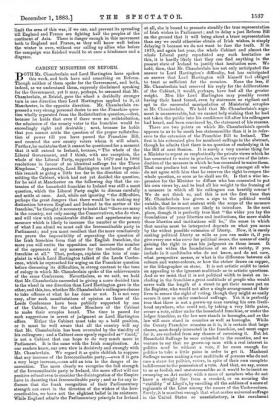TOPICS OF THE DAY.
THE MAHDL
WE are not often in accord with the Government on Egyptian questions, but in the new crisis which has arisen, their action strikes us as both wise and firm. They have appreciated the seriousness of the situation arising from the destruction of General Hicks's Army in the Soudan, but have disregarded the panicmongers, and have given no prema- ture assurances to any side. They have recognised that Egypt may possibly be threatened, and will certainly be agitated by the Mahdi's victory, and have, therefore, ordered the British garrison to stand fast in Cairo, and have sent out the drafts necessary to bring up the regiments to their full strength. They have also perceived that it may be necessary in certain contingencies, such as a successful insurrection in Upper Egypt and a rush by the Pretender to reap its fruits, to strike hard at his rear ; and have, therefore, ordered Admiral Hewett to take possession of Suakim, the only port on the Red Sea whence there is a road open for a corps d'armee marching on Khartoum. They possess, there- fore, force sufficient to quell a rising in Egypt Proper, and an open gate through which they may, if the need arise, act from India upon Upper Egypt with energy, safety, and effect. These positions secured, the British Government await further developments, before deciding upon any course of action. They do not yet know whether the Mahdi will be able to utilise his victory ; whether he will rush down upon Egypt, relying on Mussulman feeling ; whether he will consolidate his rule in the Soudan, where he is now, as the "Victorious Messenger" and agent of God, emancipated from the tribal chiefs ; or whether, as is quite possible, his idea is to rouse North Africa against the French, and put all the Moorish tribes in the field, before he attempts his own advance northwards up the Nile. The Government, therefore, wait ; and if only they have warned Lord Ripon, which we do not doubt, and have for- warded to Admiral Hewett an instruction which we will mention presently, which we do doubt, their attitude of calm expectation is the very strongest they could assume. Fortunately, Parliament is not sitting to worry them into pre- mature explanations ; and the people, as usual whether the Administration is Liberal or Tory, leave policy in Asia entirely to the Cabinet.
The pause is wise, but the situation is none the less a serious one for the Ministry. It is nearly impossible that the Mahdi should under any circumstances ascend above Amman (Syene) and enter Egypt, for we have ample time to meet him there with a civilised force, before which his followers, however fanatic, will melt away, heartless and disenchanted. But that the Mahdi's power is immensely increased is beyond doubt, and we see no evidence whatever that up to Assouan there is any trustworthy resisting force. In the first place, the victory has turned Mahommed Ahmed from a Pretender into an absolute monarch, who could execute the slave-hunting chiefs, if neces- sary, wholesale, but who will be obeyed by them as impli- citly as by the meanest of their followers. He has fulfilled the promised condition, has given the prophesied evidence of his divine commission, and as the recognised Messenger from on high, there can be in the entire Soudan no authority equal to his command. Until defeated, he will be obeyed as Mahommed was obeyed, up to the verge of civilisation, and every Mussulman up to Assouan may be counted his willing subject. More- over, with the tact which the Prophet also showed, he wages against votaries no war of extermination, but, as the few who have escaped report, accepts all Mussulmans who throw down their arms as soldiers of his own. Under those circum- stances, the old Egyptian soldiers will either desert or fight without a heart, the black populace will take up arms, and Khartoum, as Colonel Coetlogon already sees, will be indefensible. General Baker, with his 2,000 Gendarmes, half of whom go unwillingly, while the other half desert en route, can, with the aid of Admiral Hewett, hold Suakim ; but to suppose he can hold the road to Khartoum, 400 miles long, or help to defend that city, is, we think, to indulge in an illusion. He would lose half his men by desertions, and the rest in forcing the passes where Consul Moncrieff was lost. There is nothing for it, if the Mahdi advances, but to fall back ; and there is no true point of rest till Assouan is reached, and the British Army comes into the scene. The Mahdi, of course, may not advance. No European knows him, and he may be a man without energy, disposed to enjoy new power, or infected with that dread of encountering Europeans which weighs on Asiatics in exact proportion to their intelligence. But if he advances, he will, we believe, reach the "kith& bayonets ; and the chances, gravely weighed, are in favour of an. advance. The slave-dealers, who, it is said, will cheek him, will be as powerless as mice. His victory, as the French Government is aware, is already known through. North Africa, and fanatics devoted solely to him, and not to. any tribal leader, are by this time swarming towards El Obeid.. These men are armed and provisioned, and fearless of the Desert ; they do not die, like Englishmen and Egyptians, from. drinking rotten water ; and, strange as it may seem to. Europeans, they heartily believe that God has declared for the. Mahdi, that victory is assured, and that if they die in obtain- ing it, they will reach Heaven in the instant of death. It will be nearly impossible to resist their pressure ; the Mahdi himself is, in all human probability, a fanatic ;. and if he advances, he can choose only one of three paths. He may advance direct on Egypt ; he may swerve westwards. towards Barca and Tripoli ; or he may make for the coast, with the design of reaching Mecca, and thence claiming the obedience of the whole Mussulman world. In the second event our role is over, for it is France with whom the battle wilt be fought ; but in the first and third, the British Government will be compelled to act with all their energy. They must, not only for the sake of their own policy, but as mandatories of Europe, which already insists on their responsibility, defend' Egypt ; and they must, from a mere brutal instinct of self- defence, prohibit the descent on Mecca.
Admiral Hewett must, we fear, be instructed to capture or sink the Mahdi, if he attempts to cross the Red Sea. As a rule, we regard the eternal panic of English journals about the- spread of Mussulman movements into India with a certain contempt. The dangerous section of India is the North, and in Northern India the conditions are most unfavourable to Mussulman insurrection. The British Army lies there, always. ready ; the majority of the people are not Mussulman, a silent but powerful check ; and the great fighting peoples, Sikhs and. Rajpoots, Mahrattas and Goorkhas, are fanatically Hindoo.. They want no Mussulman lords, to kill their cows and dese- crate their temples, and the Mussulmans know that. Mahom- medan movements, therefore, usually when they touch India,. break into spray ; but there may be one exception to that rule.. If an Arab claiming to be the Mahdi, and consecrated by victory, were acknowledged in Mecca, we doubt if any considerations whatever would hold in the Mussulmans of North India, and. feel assured that South India would be almost instantly in flames. South India does not matter politically, for it can always be reduced ; but still a movement there, which would. cost us twenty millions and ten thousand lives, would be a, considerable disaster. Under the circumstances, three words said in Hydrabad by the boy who has just mounted the Nizam's throne, would for the moment terminate British rule south of the Nerbudda. The Mahdi must not reach Mecca, and the British Government has, therefore, to watch his move- ments, possibly through the winter, on two sides at once, with an excited and angry Egypt to keep in order the while. Wa do not envy the Foreign Secretary his task, but it must be performed, nevertheless, in the interest not of Great Britain, only, but the world.
While, however, we would earnestly enjoin watchfulness, we trust Lord Granville will be deaf to most of the wild suggestions now pouring up from every side. It is folly to say we must reconquer the Soudan, to put down the slave-trade
there. We cannot prohibit the slave-trade by an in- vasion, unless we also garrison the country ; and unless we annex Egypt, we have not the means for any such undertaking. We might as well conquer Brazil under a proclamation emancipating the Blacks, or annex all Central Africa because it is cruelly ruled. Philanthropy does not abolish the necessity for sense, and we are glad to see that the Anti-Slavery Society repudiates this suggestion. And we would reject with even more decision the idea of any appeal for help to Abyssinia. To call those dark Christians into the field against the Mahdi would be to rouse a religious war with a vengeance,—a war in which every white man in Asia would be endangered. The Mussulmans will fight the White troops fairly, knowing well that they are directed by political motives ; but to be attacked by soldiers darker than themselves on distinctly religious grounds, would rouse a fury in which all prudence and moderation would be cast to the winds. It is not our business to widen, but to
limit the area of this war, if we can, and prevent its spreading till England and France are fighting half the peoples of the continent of Asia. There is danger enough in this movement both to England and France, as they will know well before the winter is over, without our calling up allies who before the campaign was finished would be at once a hindrance and a disgrace.







































 Previous page
Previous page